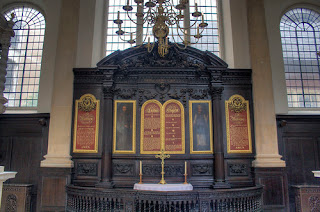"Enthusiasm had its downfall": a 1722 Oak Apple Day sermon
The deliverance from the rule of the Protectorate, "a Government founded in violence", was a cause for gratitude:
We were freed then this Day from Rapine, Plunder, Bloodshed and Oppression of all Kinds, with which we had long been harass'd , the natural Effects of Liberty and Property unguarded: As this also was, and ever will be, the Effect of a Government founded in Violence; the same Measures being always necessary to supports such Governments which at first erected them.
The bitter experience of that rule, however, was the consequence of 30th January 1649:
But had not we richly deserved all this for the unreasonable, the wicked Revenge we had taken upon the Person of our Royal Sovereign, a most excellent Prince, for a few Mistakes in his Government, which all the World saw were not committed by him with any evil Intent? He was rather driven upon them through the Necessity of his Affairs, which Necessity too was in a great Measure owing to the Artifices of those very Persons who most condemned his Mistakes, and laboured, all the Ways they could, to improve them to his Ruin.
Such criticism of Charles I's Personal Rule was a standard feature of post-1688 sermons (by both Whig and Tory preachers) on 30th January and 29th May, a recognition that parliament was integral to what Watson described as "the frame of our ancient and well constituted Government". This, however, did not at all prevent reverence for "the mildest and best natured of Princes", "our Royal Martyr".
Watson also echoed another standard feature of 29th May sermons, thanksgiving for the miraculous nature of the Restoration:
Nor were the Consequences which immediately followed it less marvelous than the Event itself. It was very strange that we should so readily give up the several Principles and Views we had so obstinately adhered to both in civil and religious Matters, and so easily fall back, as we did, into the old Forms, againſt which we had been so implacably incensed ... so powerfully did the Hand of Heaven operate in smoothing the way for our Return to it, that it was done with the greatest Alacrity, and as much Expedition too, as the sad Confusions we had run ourselves into would admit of; for within the compass of a few weeks, we had our Judges restored as at the first, and our Counsellors as at the beginning.
Recalling the "calamities" of the 1640s and 50s, the observance of 29th May called for a renewed gratitude for the constitutional order and the ecclesiastical order:
We must weigh and consider well the many Blessings and Advantages it restored to us, and with Hearts full of Gratitude to God for the same, exert our best Endeavours to preserve and improve them: Both which Points I am persuaded will be sufficiently taken Care of, when we have through the Grace of God resolved upon these two Things, viz. To be as good Subjects as the Laws of our civil Government require, and as good Christians as the Rules and Doctrines of our Church will make us.
The restoration of the ecclesiastical order was no less miraculous:
The vile Maxims and Politicks upon which we had lately acted, were in the utmost Disgrace, and, for the bitter Effects they had produced, renounced with a general Abhor, the Word of God came again to be handled with Learning and Sincerity, and was no longer made a stumbling block to our Feet, but gave light unto our paths. His Priests, his Altars, and the Beauty of his Worship were again restored to us, after they had suffered, almost beyond Hope of Recovery, all imaginable Despite and Profanation.
After the decades marked by "plundring, sequestering, imprisoning and every other way persecuting all the rest of the loyal and orthodox Clergy of the Land, making not only their Loyalty and Orthodoxy, but their very Learning a Crime in them", the restoration of "a most excellent Church" was to be an important aspect of 18th century Anglican self-understanding:
the Remembrance we ought to have of this Day, that we should upon all Occasions shew ourselves truly zealous for our holy Religion; that pure reformed Religion, I mean, which is profess’d in this our established Protestant Church. For it was not the least of those Mercies which we received on this Day, that, by the Event of it, Enthusiasm had its Downfall, and Popery, which had been secretly at Work by it, was by that Means put farther from us. It cannot therefore be an unsuitable Return for us to make, but much the contrary, to endeavour by all the prudent Methods Christianity admits of, to preserve and propagate that Faith and Worship, which Heaven did as on this Day, with so many signal Marks of its Approbation, rescue and restore to us.
With the restoration of the constitutional and ecclesiastical orders, "Enthusiasm had its downfall", a phrase which wonderfully captures how 29th May was crucial to the Anglican imagination during the 'long 18th century'. What is more, it points to what should remain an abiding Anglican concern: that Enthusiasm in politics and religion threatens the good gifts of constitutional order and ecclesiastical order, gifts integral to civic and ecclesial peace and flourishing.




Comments
Post a Comment